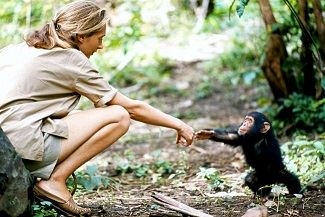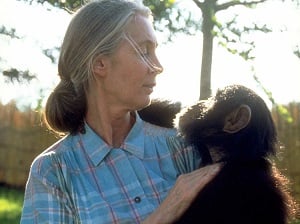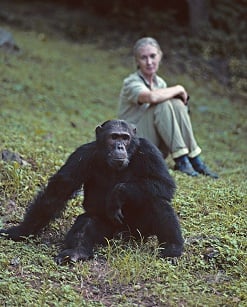 |
| (http://www.greenteamgazette.com/2014_04_01_archive ()) |
Joseph Campbell once said,"A hero is someone who has given his or her life to something bigger than oneself." Jane Goodall fits this description because she dedicated her life to bring attention to the ethical treatment of animals and the environment in which they live. She was born on April 3, 1934 in London. Her career started while staying with a friend in Kenya, where she met Louis Leakey, a well known paleoanthropologist. He sent her on a field assignment in 1960 to study and live with the chimpanzees. I chose Jane Goodall as my hero because I admire how determined she was to do what she loved and how she stood up for the animals.
Jane Goodall faced many hardships throughout her life. According to Curt Schleier, "Her parents divorced when Jane was 12, and though her father was barely a factor in her life after that, Jane's mother, Vanne, was a constant, nurturing influence"(Schleier). Even though she faced many obstacles, her mother supported her completely, even participating in Jane's fieldwork. Another major event that happened in Jane Goodall's life was that, "[She] returned to England to begin [working] on a Ph.D. in ethnology at Cambridge under a program that accepted her professional experience in lieu of undergraduate degrees and required only a dissertation" (Schleier). Another obstacle she faced in her career was her lack of a college education. Many of the scientists that received her findings did not find them credible. She was determined to get a degree so that the people she was working with would accept her research.
 |
| (http://nymag.com/thecut/2014/10/young-fans-cry-in- ()) |
One of the most important places in Jane Goodall's life was in Africa, where she began her career as a primatologist, and where she met Louis Leakey. "In 1960, Leakey sent the unqualified but enthusiastic Goodall out to live among the chimpanzees in the rugged and remote Gombe animal preserve, recording the animal's' behavior and interactions"(Schleier). This was a very important time in her life because it led to many discoveries about chimpanzees and how similar they were to humans. Her discoveries made scientists reevaluate the characteristics that defined the human species.
Jane Goodall was determined to do what she loved even when it was very dangerous, or when no one took her seriously as a scientist. While she was in Africa, four researchers were kidnapped by local rebels. "Because of continued risk, almost all of the many European and American researchers left Gombe. Goodall continued to carry out her work with the help of local people who had been trained to conduct research"("Jane Goodall" Encyclopedia). Jane Goodall faced many obstacles, but she didn't let anything stop her. One problem she encountered was that her approach differed from other scientists. "From the day she began her legendary chimpanzee research in Gombe, Jane Goodall took an unorthodox approach to her subjects. She immersed herself in their forest habitat with the fresh perspective of a mind uncluttered by academia" ("About Jane"). A second problem she had was that she did not go to college, and she had no experience. She was so determined to continue her research that she went back to college to get a degree in ethnology.
 |
| (https://www.khanacademy.org/partner-content/big-hi (https://www.khanacademy.org)) |
Another reason that Jane Goodall is a hero is because she used her fame to bring attention to the ethical treatment of animals and the health of the environment; she continues her efforts to this day. "Goodall's efforts to educate people about the ethical treatment of animals extended to young children as well. Her 1989 book, The Chimpanzee Family Book, was written specifically for children, to convey a new, more humane view of wildlife" ("Jane Goodall"). She focused the world's attention on the way animals were being used for product and medicine testing, especially chimpanzees, whose DNA is very similar to that of humans. "Goodall used her expertise and fame to lobby for limitations on the number of animals used in such experiments and to convince researchers to improve the conditions under which the animals are kept" ("Jane Goodall" Encyclopedia). Currently, she spends her time continuing her work, building rehabilitation shelters in africa for orphaned apes and funding many non-profit organizations dedicated to improving the health of the environment, and the animals that live in that environment.
Jane Goodall is a deserving hero because she dedicated her life to making things better for the primates and their environment. "She uses her iconic status to raise funds to preserve wilderness, to fight for animal rights, and to increase concern for the environment"(Schleier). Jane has built several rehabilitation centers for malnourished and injured apes that have suffered from wildlife trafficking and poaching, helping to prevent their extinction. She overcame many obstacles throughout her life, and her research changed the not only the way we view chimpanzees, but also the way we view ourselves.
Works Cited
"Hero Quotes." BrainyQuote, Xplore, 2017, www.brainyquote.com/quotes/keywords/hero.html.
"Jane Goodall." Notable Women Scientists, Gale, 2009. Biography in Context,
link.galegroup.com/apps/doc/K1668000158/BIC1?u=powa9245&xid=f241504b. Accessed 12 Jan. 2017.
"Jane Goodall." Encyclopedia of World Biography, Gale, 1998. Student Resources in Context,
link.galegroup.com/apps/doc/K1631002607/SUIC?u=powa9245&xid=bf7455e2. Accessed 18 Jan. 2017.
Schleier, Curt. "Jane Of The Jungle." Biography 4.5 (2000): 88. Biography Reference Center.
Web. 12 Jan. 2017.
"The Jane Goodall Institute." The Jane Goodall Institute, 2017, www.janegoodall.org/.
Page created on 2/7/2017 12:00:00 AM
Last edited 2/7/2017 12:00:00 AM
